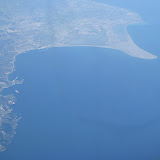Men in the World
Today I discovered something vastly important.
Yesterday I met two men -- one an Algerian living in Paris without papers, and the other a Palestinian who is in Paris with his family (and has been for over 30 years). Both harbored some kind of longing.
The Palestinian man longed for a proper Palestine with a government free from corruption, that cares about the people, and that will fight for the right for Palestinians to return if they wanted. He was clearly angry - angry at those who left Palestine, angry at those who betrayed Palestine, angry at those who sell their land in Palestine. He is likely angry at himself.
The second man I met was Amin. At first his story was that he was born in France to immigrant parents, but he later told me that he had come 9 years ago and was living there illegally. He wants to marry - 'life alone is not a good life' - he's a 32 year old man who has been single for 5 years. The problem is that he doesn't have stable work. How can he provide for a family without stable work? He wants to be a pastry chef and have his own business.
These encounters made an impact on me, because it made me think about what it's like to be a man in ghorba? (Ghorba is an arabic word that derives from the same word for 'west,' which basically means “not home.” So a person living in ghorba is living somewhere that is not home) I imagine that it would somehow make that man feel impotent in some way or another, for he either doesn't have access to the resources necessary to take care of his family, or he is disconnected with his homeland and therefore feels an absence.
Thinking about men in this way is very important for me because it means that I’m open to being empathic to their situations, taking them as fallible human beings who are vulnerable, have dreams, sometimes get disappointed, sometimes disappoint. And to prove yet again that our work is indeed personal, I made the connection between my empathy for these men to my dissertation choices. I am working on three male artists, all in various states of relation to their homelands. One is willingly in diaspora, the other goes back and forth between home and ghorba, and the third cannot go back because he has the wrong passport. What will I learn from these different men and the ways they deal with their situations? I realized today that writing the dissertation will be more than an intellectual and academic challenge. It will be more than an emotional challenge in terms of its impact on my self confidence. I think and I pray that it will be an undertaking that will help me get through and over those major blocks that have thus far stopped me from going where I need to be.
Yesterday I met two men -- one an Algerian living in Paris without papers, and the other a Palestinian who is in Paris with his family (and has been for over 30 years). Both harbored some kind of longing.
The Palestinian man longed for a proper Palestine with a government free from corruption, that cares about the people, and that will fight for the right for Palestinians to return if they wanted. He was clearly angry - angry at those who left Palestine, angry at those who betrayed Palestine, angry at those who sell their land in Palestine. He is likely angry at himself.
The second man I met was Amin. At first his story was that he was born in France to immigrant parents, but he later told me that he had come 9 years ago and was living there illegally. He wants to marry - 'life alone is not a good life' - he's a 32 year old man who has been single for 5 years. The problem is that he doesn't have stable work. How can he provide for a family without stable work? He wants to be a pastry chef and have his own business.
These encounters made an impact on me, because it made me think about what it's like to be a man in ghorba? (Ghorba is an arabic word that derives from the same word for 'west,' which basically means “not home.” So a person living in ghorba is living somewhere that is not home) I imagine that it would somehow make that man feel impotent in some way or another, for he either doesn't have access to the resources necessary to take care of his family, or he is disconnected with his homeland and therefore feels an absence.
Thinking about men in this way is very important for me because it means that I’m open to being empathic to their situations, taking them as fallible human beings who are vulnerable, have dreams, sometimes get disappointed, sometimes disappoint. And to prove yet again that our work is indeed personal, I made the connection between my empathy for these men to my dissertation choices. I am working on three male artists, all in various states of relation to their homelands. One is willingly in diaspora, the other goes back and forth between home and ghorba, and the third cannot go back because he has the wrong passport. What will I learn from these different men and the ways they deal with their situations? I realized today that writing the dissertation will be more than an intellectual and academic challenge. It will be more than an emotional challenge in terms of its impact on my self confidence. I think and I pray that it will be an undertaking that will help me get through and over those major blocks that have thus far stopped me from going where I need to be.



0 Comments:
Post a Comment
Subscribe to Post Comments [Atom]
<< Home